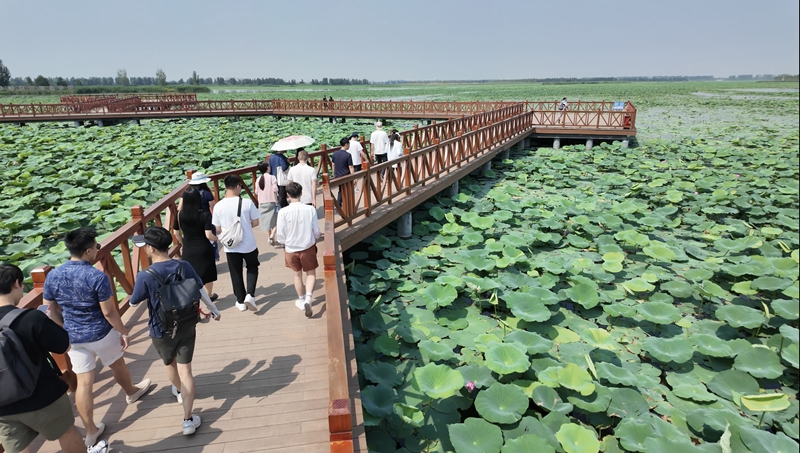Future Close-Up young representatives explore Xiongan New Area

Young representatives participating in the 2024 Future Close-Up program visit Baiyangdian, or Baiyang Lake, in Xiongan New Area on June 19. [Photo/CICG]
Young representatives participating in the 2024 Future Close-Up program from June 18 to 19 visited Xiongan New Area in Hebei province, enjoying the city's well-crafted ecology and smart advancements.
The Future Close-Up is a high-level youth exchange program jointly initiated by the China International Communications Group (CICG) Center for the Americas and the Marketing and Public Relations Department of Chinese tech titan Tencent in 2023. It aims to facilitate exchange and deepen participants' understanding of China through immersive tours and dialogue activities.
This year's program, running from June 13 to 21, invited 27 youth representatives from 21 countries and regions, including China, the United States, Russia, Germany, Italy, Thailand and Japan to visit Beijing, Shenyang in the northeastern province of Liaoning, and Xiong'an New Area.
"The establishment of Xiongan New Area in Hebei province is a historical and strategic decision to advance the coordinated development of the Beijing-Tianjin-Hebei region. It is a project of millennial significance and a matter of national importance," Wang Jiping, director of Government Office of Xiongan New Area, said at a welcoming dinner on June 18.
Wang said that over the past seven years, Xiongan New Area has achieved important milestones. It is rapidly developing into a city of future that blends Eastern and Western elements, a green and low-carbon ecological city, a hub of digital innovation, a happy and livable city, and an open city that embraces diversity.
"Xiongan belongs not only to China, but to the world," Wang said, adding that he encouraged the young representatives to explore and experience Xiongan's remarkable advantages in new quality productive forces and to feel the warmth and friendliness of its people and share its story with the international community.
"Xiongan is a beacon of China's vision for the future development of its cities. It embodies the Chinese vision for cities, for green development, for sustainability, for innovation and for smart urban building," Liu Yunyun, associate editor-in-chief of the CICG Center for the Americas, said at the welcoming dinner.
"Youth is not a time of life; youth is a state of mind," Liu encouraged the young representatives to make friends and engage in mutual learning and exchange, saying that young energy, curiosity, and the ability to engage with the world and the people around them will make the world a better place, bring them together, and drive them forward.
During their two-day visit, the delegation went to several destinations, including Baiyangdian Lake, a famous ecological site covered in lotus blossoms in summer, and the control center of Xiongan Intercity Station, to get a firsthand feel for the city's green and smart development.
Phillip Forman, a real estate developer and tech entrepreneur based in the U.S., said that what surprised him most about Xiongan was that blue and green spaces (water and trees) need to consistently account for 70% of the area.
He believed this to be a vital characteristic because discussions on large cities often overlook the natural and ecological aspects; Xiongan is different. Before arrival, he'd imagined it to be a slightly smaller version of Beijing next to the capital, or a 2.0 version of Beijing. However, upon arrival, he discovered that the new area is, in fact, a completely new concept.
Xiongan's urban planners and builders had visited at least 20 countries to learn from their urban development experiences and then tailored these insights to their unique situation, which left a profound impression on Forman.
Alland Dharmawan, personal assistant to the advisor to the President at Presidential Advisory Council of the Republic of Indonesia, said there is much to learn from Xiongan in terms of green development. He mentioned that Indonesia is currently building its new capital, Nusantara, on Kalimantan Island, a place rich in tropical rainforest resources. Like Xiongan, the intention is to make Nusantara a green city, Dharmawan said.
Addressing global challenges such as climate change requires not only promoting economic development but also taking good care of the environment, he said.
Edward Neale Knight, a geopolitical researcher with the Tony Blair Institute for Global Change, said that unlike the traditional approach of addressing pollution after it occurs, Xiongan has focused on ecological management and protection from the very onset. This proactive approach very much impressed him.
Chew Vee Kuan, a tech entrepreneur from Malaysia, is particularly interested in the use of underground space in Xiongan. He said that whereas above-ground development has its limits, with excessively tall buildings sometimes negatively impacting urban growth, the potential for underground space is immense.
Having lived in many cities around the world, his experience in Japan highlighted the convenience of underground transportation. He said Xiongan clearly demonstrates that China is indeed incorporating the world's most advanced concepts and technologies.
The youth delegation, with assorted experiences and understandings of China, featured a multifaceted view of the country. By sharing these perspectives with each other, they formed a comprehensive picture of the nation, something Chew Vee Kuan believed to be the Future Close-Up program's main feat.
Kseniia Mikhailova, a humanitarian worker from Russia, said what had impressed her most during this trip to Xiongan had been the urban construction sites. She noted that every step of the city's construction was meticulously organized. Observing just a corner of the construction site at Xiongan Intercity Station, she understood why the city had been able to develop so rapidly.
She elaborated that despite the extensive interaction and cooperation between Russia and China, the Russian public's understanding of China is rather narrow, and stereotypes persist. On this first visit to the country, everything exceeded her expectations. The different personal and professional backgrounds of the youth delegation allowed her to better understand China, and the world, from different perspectives.
Colombian Juan Camilo Camargo Amaya, Global Program Director of Mentors International, said that in Latin America, people's channels for learning about China are very limited.
He added this trip had been "wonderful," giving them the opportunity to visit China and understand the country through direct interactions with its people, allowing the young participants to learn more about China's culture, society, infrastructure development and innovations.


